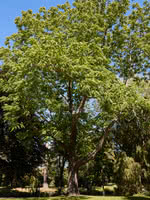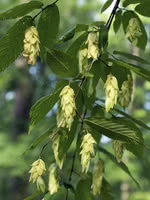Mon-Fri 9am - 5pm Mountain time
Black Walnut vs Ironwood Tree
Juglans nigra
Ostrya virginiana
NOT AVAILABLE THIS SEASON - MIGHT RETURN
NOT AVAILABLE THIS SEASON - MIGHT RETURN
The Black Walnut is a slow growing, large, straight-stemmed tree with an open crown. It produces dense, very hard, edible nuts.
Black Walnut has a deeply-furrowed, black bark. Its leaves are about 1 foot long, composed of 15 - 23 slightly stalked leaflets on a moderately stout stock which provide good dappled shade.
Despite being highly valued for its edible nuts and its shade tree aesthetics, it is rare to see this tree on the prairies.
Note: Black Walnut's roots produce a substance named juglone that is toxic to some other plants. Consider this when choosing where you plant a black walnut, as you will not be able to grow tomato, potato, cabbage, eggplant, blueberry, azalea, rhododendron, lilac, red pine and apple in the surrounding area.
Note: Plant this tree once. It will not respond well to transplanting.
Note: Although self-pollinating, planting two trees significantly improves nut production.
Ironwood Tree is one of the strongest and most resilient trees you will find in North America. In fact, it has the hardest and most dense wood of any North American tree. Prized for its oval shaped canopy and showy winter trunk, this striking shade tree will make a beautiful addition to any yard. Make sure you do not plant near roads as it is highly salt sensitive.

